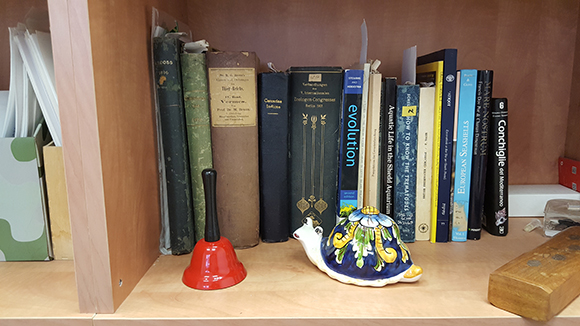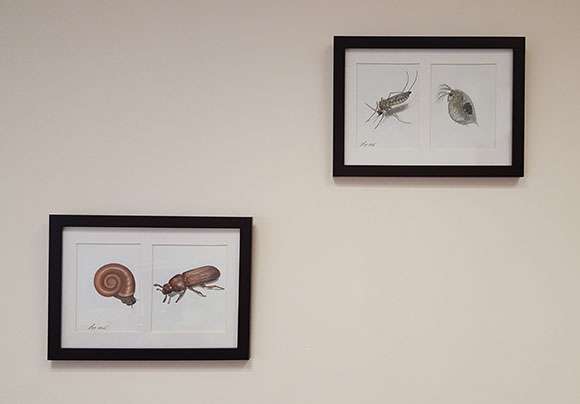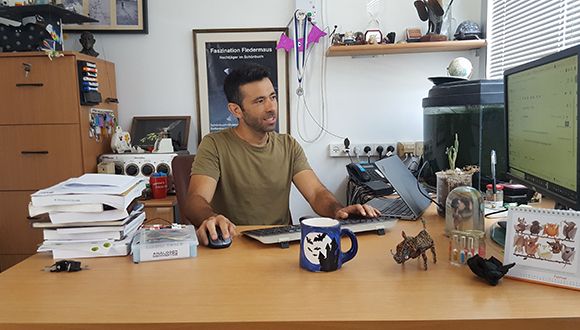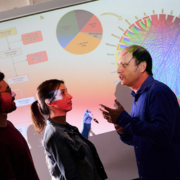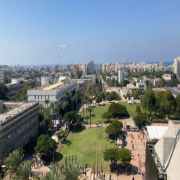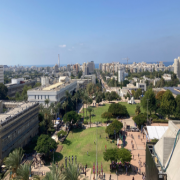What do top scientists keep on their desks?
From tiny crabs to orange straps to models of animal heads, what do their desks say about our researchers?
They say your desk is a reflection of your mind - so what do the desks of our scientists say about them? In an unusual move, we decided to lean into our nosy side and spotlight the desks of some of TAU's most prominent researchers. Here are some of the treasures we found:
Dr. Tom Schonberg - Neuroscience
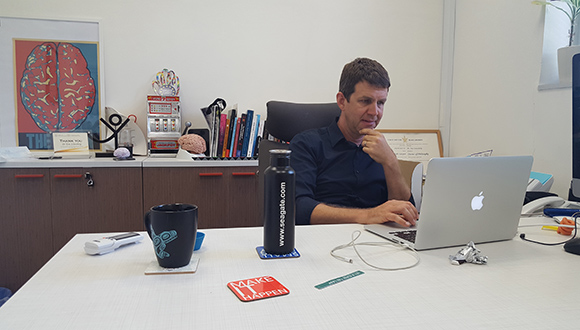
My research:
I study the neural basis of behavioral change, and how we make decisions when presented with multiple options.
You will always find on my desk:
I'm a coffee snob and almost always have dark chocolate (at least 70%) to offer guests with their coffee.
Hard to miss:
1. I have two coasters on my desk. Anyone who sits down gets both, as a decision-making experiment. I almost always choose the one that says "Make it happen," but expect every student to choose the one that says "Small steps everyday".
2. On the shelf behind me I have a slot machine I bought at garage sale in Santa Monica when we moved for my post-doc. I was told it was an antique and I fell for it, not bargaining for the price. When I left, I discovered it was from 1984. For popular lectures on the neural basis of decision-making with high risk factors, I use the model of the brain and the machine, to illustrate the interdisciplinary nature of studying decision-making in the brain.
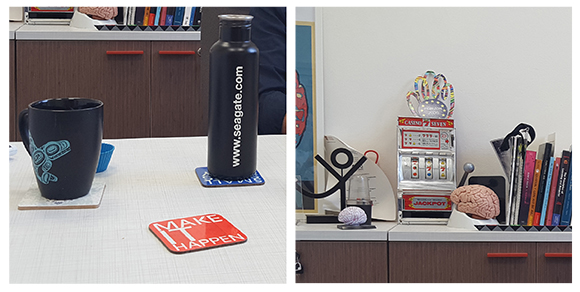
Prof. Hadas Maman - Engineering
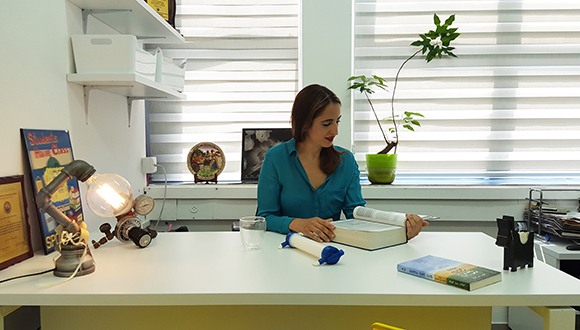
My research:
I investigate effective ways of preventing water pollution as well as developing tech that purifies water from industrial waste. My research comes from a personal and emotional place. I feel like I was born to purify water, and I believe that the role of academia is to create an impact in the world.
You'll always find on my desk:
A lamp made of iron sewer pipes that I got from my students when I became a professor. My research examines how water can be sterilized with radiation, without introducing chemicals like chlorine into the water. The bulb symbolizes the sun’s rays.
Hard to miss:
The book "Water treatment - principles and design", the bible for the development of water purification technologies; a membrane of ultrafilration that can filter viruses; behind my desk you can see a plate from India that I got as a gift from a student I taught there, a picture of Spongebob that says "Students have class" and reminds me teachers have to approach students in new ways and learn from them. Even the potted plant represents the connection between energy and water.
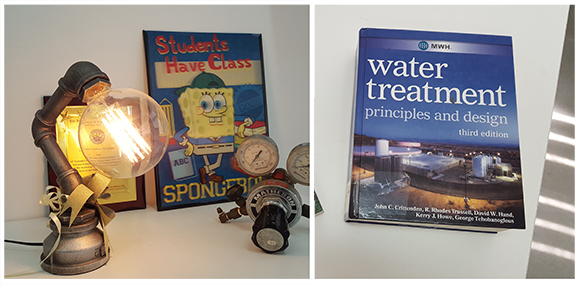
Prof. Yossi Yovel - Life Sciences
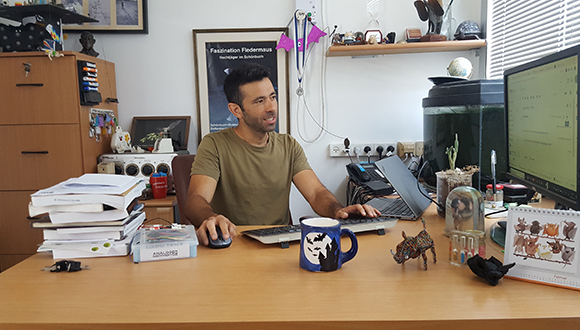
My research: I study bat sonars in order to mimic their impressive capabilities, for example to improve the navigation of agricultural robots.
You'll always find on my desk:
A calendar with illustrations of bats and a model of a bat’s head, created with a 3D printer. What’s special about this particular bat is that it has huge ears, which we study. The model allows us to do simulations, such as inserting a microphone into the ear, which is difficult to do with a live bat.
Hard to miss:
A jar with a drink made from a bird's nest. I traveled all the way to Thailand to study a bird from the swift family that lives in caves. It’s a very interesting bird because it lives in dark caves and has therefore developed the ability to use a sonar (like a bat). The locals raise them in the special towers and make a living from them. They also make soups out of the birds and sell them to the Chinese, as well as drinks they consider to bring good luck and other virtues. We got the drink as a gift from the locals who helped us with the our research, and we even took a risk and drank it.
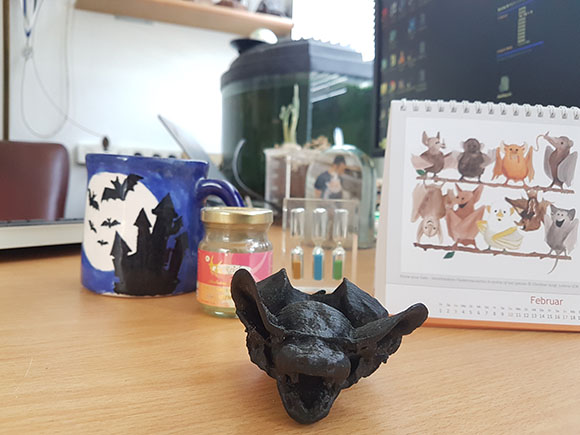
Prof. Yael Steinhart - Management
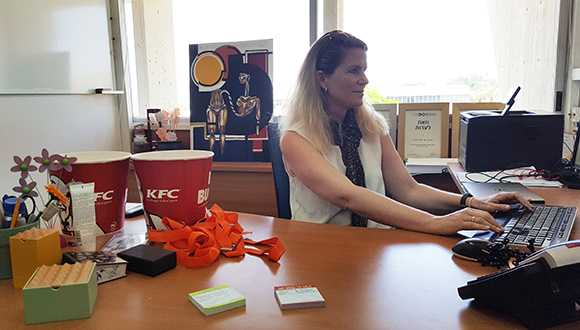
My research: Consumer behavior. I study what factors affect us when we make purchasing decisions, in a variety of consumer situations, such as: online shopping, investing in a product through a crowdfunding website, and buying a product at auction (e.g. eBay); And what happens when we’re exposed to information from various sources, such as advertisements or other people's reviews.
You’ll always find on my desk: Memo notes so as not to forget anything.
Hard to miss:
The glowing orange strips on my desk were part of an interesting study in which we examined the impact of company policies intended to "capture" consumers (a bit like Stockholm syndrome). We brought two professional hair stylists to the university, and the test subjects were invited to get a haircut, for a fee. In portion of the study, the subjects were tied to the chair at the time of the haircut with the help of these orange strips, and in the other portion, other subjects were not tied down. We found that those in the "captivity" portion liked the haircut more and were more likely to recommend the hair stylist to others! This experiment was part of a series of studies that we conducted under controlled laboratory conditions as well, and that time we took it out to the field, to examine "real" consumer behavior.
Dr. Michal Gruntman - Environmental Sciences
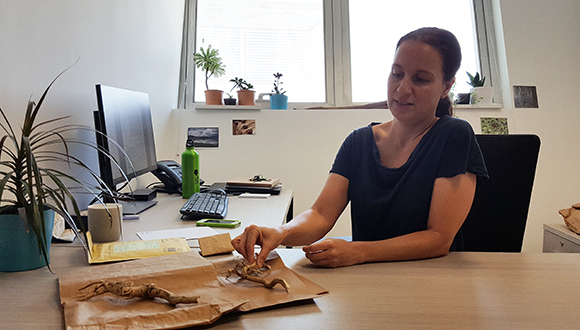
My research: I study plant ecology, especially how plants respond to a changing environment, for example, when competitors or herbivores appear, or when there are nutrient or soil contamination changes, whether they change their strategies accordingly or not.
You’ll always find on my desk: a green (literally) bottle of water that I received at the Israeli Plant Ecology Conference.
Hard to miss: Roots of white mustard, which we want to study to see if they store heavy metals in them, to use later in a process called phytoremediation, which means cleaning contaminated land through the use of plants. We also collected their seeds, and later we can also use those in the experiment.
Behind me are potted plants, including a very interesting plant, phyla nodiflora, that grows wild near water reservoirs and is flood-resistant, and we want to see if it changes its responses according to the flood level.
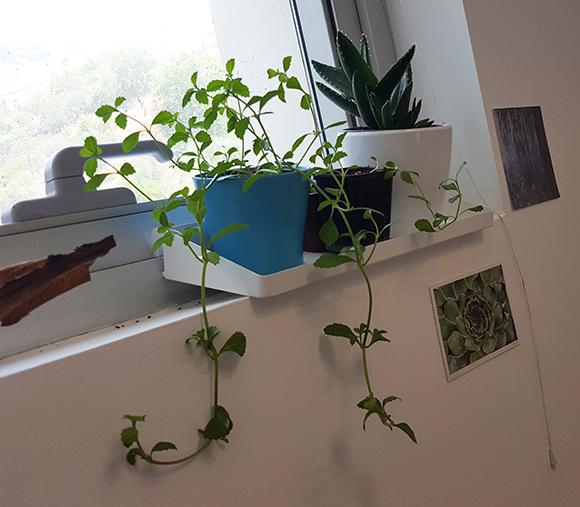
Dr. Frida Ben-Ami - Life Sciences
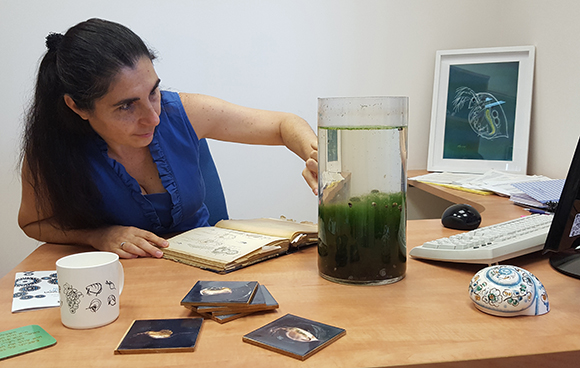
My research: I explore the ecological and evolutionary relationships between parasite and host. I focus on freshwater snails and Daphnias (which are tiny water crabs) and their parasites. In addition, we are researching asexual reproduction of snails and trying to answer the question "why is sex necessary?" If asexual reproduction is possible, then why do we need sexual reproduction? One explanation is that because the parasite adapts to its host, asexual reproduction in which the individual replicates itself will allow the parasite a more comfortable breeding environment, than sexual reproduction which will mix up the genes and cause changes that will work to the parasite's detriment.
You’ll always find on my desk: the creatures I study surround me everywhere: I have a mug with Daphnias illustrations; coasters with photos of Daphias, made by one of my students who took the pictures himself, and a coaster that says: "The snail is a smart animal. When it meets an unwanted neighbor, it leaves with its house on its back." My office is full of snail figurines, that students and friends bring me as gifts from all over the world.
Hard to miss: A large aquarium with Daphnias, freshwater snails and seaweed. Behind me is a painting by of a Daphnia by artist Tuvia Kurtz, one of the top nature illustrators in Israel, which I received as a gift from my PhD supervisor, Prof. Yossi Heller. On the wall are additional pictures that Tuvia has painted for our latest study.
Among the books on the shelves, you will find books from the 19th century, with illustrations of Daphnias, worms and other organisms, with amazingly detailed and anatomically correct explanations. It’s amazing to see that the information was already so extensive back then. The red bell we use at our speed dating events, for graduate students and potential supervisors, which we organize as part of our graduate program. This year a similar event will take place in October, and anyone interested in the advanced study of life sciences is very welcome to come.
